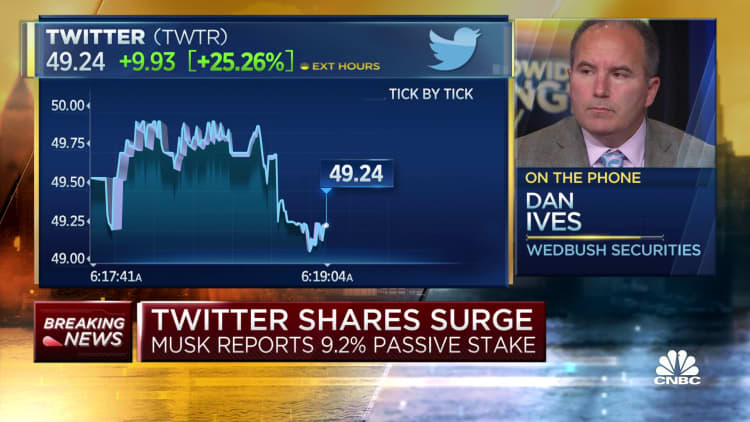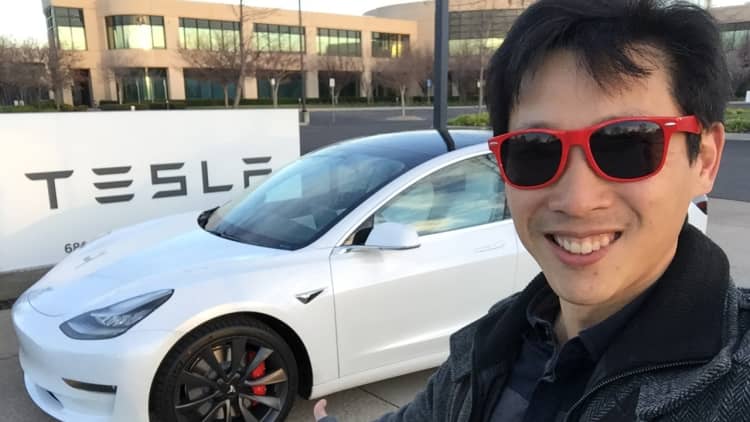Elon Musk and Twitter have always been a volatile combination. That's especially unlikely to change now, with Musk buying a 9.2% stake in the social media company and landing a seat on Twitter's board of directors.
The stake, which was disclosed in a regulatory filing on Monday, is valued at more than $3 billion. For context, Twitter co-founder and former CEO Jack Dorsey's stake in Twitter is just over 2% — and Dorsey, who stepped down as CEO in November 2021, is leaving Twitter's board when his term ends in May.
Musk's board term will last until 2024, the company said in a separate regulatory filing, functionally making him a more powerful figure within Twitter than Dorsey going forward. "Looking forward to working with [Twitter CEO Parag Agrawal] & Twitter board to make significant improvements to Twitter in coming months!" Musk tweeted on Tuesday.
In a March 26 tweet, Musk accused the platform of "failing to adhere to free speech principles" and said he was giving "serious thought" to building his own social media platform. A regulatory filing with the Securities & Exchange Commission shows that Musk acquired his Twitter stake on March 14, meaning he was already Twitter's largest outside shareholder when he publicly called out the platform.
On Tuesday, Twitter noted that Musk's stake in the company cannot exceed 14.9% for the duration of his board term, but analysts told CNBC on Monday that Musk could still look to increase his ownership stake over time. Investors seem to be betting that Musk can exert control at Twitter: The social media company's stock surged by 27% on Monday, and kept climbing after the company announced Musk's board seat on Tuesday.
Here's a look at how much power Musk will actually have at Twitter going forward, and the changes he might want to make:
How much power will Musk have at Twitter?
Musk's piece of Twitter is technically categorized as a "passive" stake, which means it falls just below the 10% threshold for a shareholder to be considered to be an "active" or "activist" shareholder. Typically, passive shareholders don't try to exert much control over a company's decision-making. Musk might be the exception to that rule.
Twitter's board of directors currently has 11 members, with Musk becoming the 12th board member, at least until Dorsey leaves next month. Musk will also control more than 9% of the shareholder votes. Functionally, that means he'll need plenty of support from other board members and shareholders to win their approval for any future proposals.

But considering the fact that Musk is an extremely high-profile and outspoken investor, with more than 80 million followers on Twitter's platform, the world's richest person is already in a strong position to push for changes. And Twitter's rapid addition of Musk to its board shows that its leadership is at least willing to entertain the billionaire's ideas.
In tweets on Tuesday, Agrawal hinted that Musk could already have support among the company's other board members, writing that recent conversations with Musk led the group to believe "that he would bring great value to our board."
"He's both a passionate believer and intense critic of the service which is exactly what we need on
Twitter, and in the boardroom, to make us stronger in the long-term," Agrawal added.
Dorsey has also publicly voiced his support for Musk as a board member, tweeting on Tuesday that Musk "cares deeply about our world and Twitter's role in it."
What does Musk want?
The general perception from market analysts – and anyone who has followed Musk's lively Twitter feed – is that the highly outspoken billionaire's primary goal is to push for changes in Twitter free speech policies.
In recent years, Twitter has stepped up actions to battle misinformation and violent or inciting speech on its platform, even banning users who violate its guidelines — like, for example, former President Donald Trump. Some critics say the company needs to go even further down that road. Musk has instead criticized Twitter from the other direction, while openly complaining about regulators trying to "chill" his own right to free speech on social media.
Musk hasn't yet specified exactly what steps he would like to see Twitter take in order to promote free speech on the platform, but some of his recent tweets indicate that he could use his new position to push back against the company's content moderating policies and increased attempts to rid the platform of users who violate Twitter's guidelines.
In March, Musk launched a Twitter poll asking this question: "Free speech is essential to a functioning democracy. Do you believe Twitter rigorously adheres to this principle?"
More than 70% of respondents voted "No," leading to a follow-up tweet from Musk arguing that Twitter "fundamentally undermines democracy" by allegedly stifling free speech.
Twitter is a private company that's free to regulate the content shared on its platform without violating anyone's free speech rights. But Musk, who calls himself a "free speech absolutist," has even suggested that Twitter's algorithm become "open source" as a way of promoting transparency over how the platform displays and promotes tweets. That idea could gain traction among Twitter's board members, as Dorsey has endorsed it in the past.
An "edit" button, allowing users to change tweets after they're posted, could also finally be on the way: On Monday, Musk tweeted a poll asking his followers if they'd want an edit button on Twitter, with more than 73% of respondents replying that they would.
Agrawal responded to the poll by quoting Musk's own words back to him: "The consequences of this poll will be important. Please vote carefully."
Sign up now: Get smarter about your money and career with our weekly newsletter
Don't miss:
Elon Musk: CEO is a 'made-up title,' so he's Tesla's 'Technoking' instead
Elon Musk: 'I really didn't want to be CEO of Tesla'—here's how he says it happened


